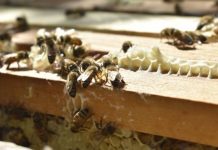CRESTED BUTTE, Colo., June 14 (UPI) — Sunflower pollen specialization has evolved multiple times among bee species, which is odd, because studies show bees fed an all sunflower pollen diet exhibited stunted development.
New research suggests the bees attraction to the sunflower family — which includes dandelions, daisies, and thistles — may be explained by its pollen’s medicinal properties, specifically the ability to protect bees from parasites.
Scientists arrived at the realization after noticing the nests of sunflower specialist species weren’t being targeted by a common brood-parasitic wasp family known asSapygidae.
The wasps lay their eggs in the nests of solitary mason bee nests. The wasp larvae consume the bee eggs and pollen reserves.
When researchers fed wasp larvae sunflower pollen reserves, they found the rate of survival was much lower than larvae fed other types of pollen.
The findings were published this week in the journal The American Naturalist.
“Our results suggest that specialization on low-quality pollen may evolve because it helps protect bees from natural enemies,” researchers wrote.
More broadly, scientists suggest species’ taste for unappetizing or low-nutrient food sources may be explained by the food’s protective properties.





